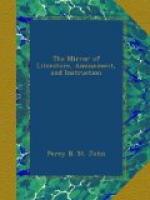Thus far Shakspeare treads in the steps of the annalist; the only difference is in the fate of the hero; in the one he finds a kingdom, in the other a grave. Saxo Grammaticus carries the history further; and after the crowning of Hamlet as king, brings him again into Britain, where, in compliment to that land of beauty, he marries a second wife, the daughter of a Scottish king. Hamlet brought both his wives to Denmark, and prepared for a long life of prosperity and peace. But the sword hung over his head; war burst around him, and he fell in combat by the hand of Vigelotes, son of Ruric. Saxo Grammaticus sums up his character in a few words: “He was a wise prince and a great warrior. Like Achilles, he had the principal actions of his life wrought on his shield. The daughter of the king of Scotland casting her eye on it, loved him for the battles he had won, and became his bride.”
* * * * *
SPIRIT OF THE PUBLIC JOURNALS.
* * * * *
ENGLISH FRUITS.
(Concluded from page 295.)
The Vine.—The value and transcendant excellence of this foreign fruit is too well known to require any extended account in this paper; as a native of the southern verge of the northern temperate zone, it only requires its natural degree of heat to bring it to perfection. The growth is luxuriant, is fertile, easy of management, and as it requires support, obedient to the trainer’s will. Many excellent varieties ate in our stoves and vineries; differing in hardness, size of bunches, and in colour and flavour of fruit. These, it is likely, have been gained from seeds; and as its cultivation has been primaeval with the inhabitants of the earth, no wonder it received, for its unequalled utility, their chiefest care.




